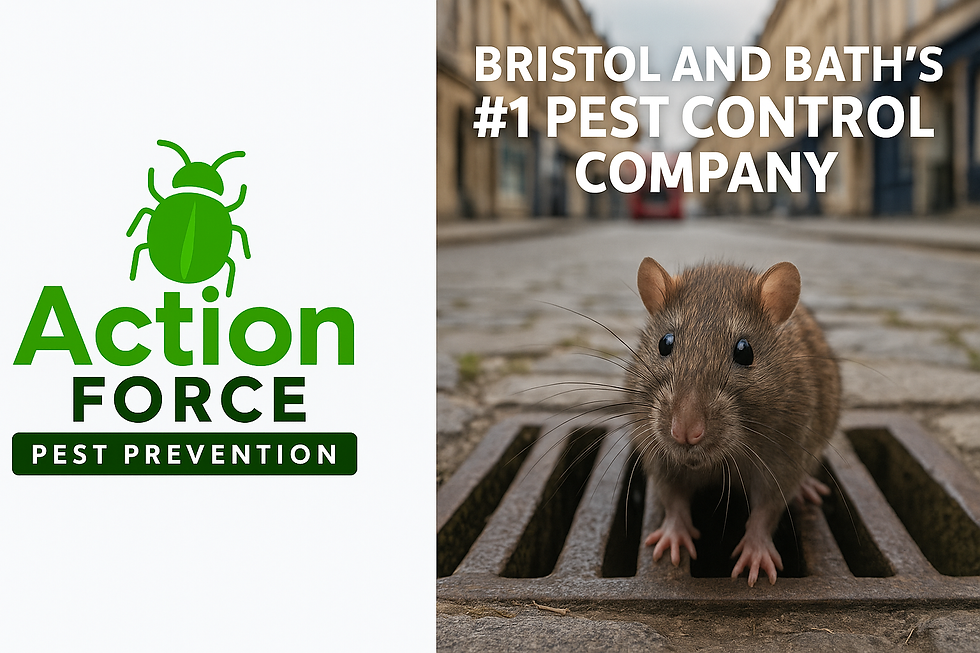The Sneaky Truth About Rats: A Guide to Understanding and Controlling These Persistent Pests Rats.
- Action Force

- Dec 19, 2024
- 3 min read

The word alone can send shivers down your spine. These aren't just the cute, cartoonish creatures of children's stories; they're persistent pests that pose significant threats to our health, homes, and businesses. This blog aims to shed light on these often-misunderstood creatures, helping you understand the dangers they pose and how to effectively manage them.
The Dangers Lurking in the Shadows
Rats aren't just a nuisance; they're a serious health hazard. Their droppings and urine contaminate food and surfaces, spreading a range of diseases including leptospirosis (Weil's disease), salmonellosis, and even hantavirus. Beyond the health risks, rats cause significant property damage by gnawing through electrical wiring (creating fire hazards), pipes (leading to leaks and flooding), and even structural components of buildings. For businesses, a rat infestation can be devastating, leading to reputational damage, fines, and closure.
Identifying the Enemy: Rat Spotting 101
Two main rat species are common in many parts of the world: the brown rat ( Rattus norvegicus) and the black rat (Rattus rattus). Brown rats are larger, stockier, and have shorter tails than their black counterparts, who are more agile and often found in higher places. Knowing the species isn't always crucial for control, but recognising the signs of their presence is. Brown rats are more common in the UK whilst you may find black rats around harbours and ports.
Understanding Rat Behaviour: A Glimpse into Their World
Rats are remarkably intelligent and adaptable creatures. They are primarily nocturnal, active at night when searching for food and water. They're social animals, living in colonies, which means spotting one rat is a sure sign of a larger problem. Their incredible climbing, jumping, and swimming abilities make them exceptionally difficult to control without professional help. Their breeding habits are alarmingly prolific, a single pair can produce thousands of descendants in a year!
Rat Control Methods: A Multi-pronged Approach
Rat control requires a multi-pronged strategy. DIY methods like traps and rodenticides are available, but these often have limitations. Rodenticides, for example, can be dangerous if not used carefully and, even more concerning, rats are developing resistance to common active ingredients. For effective, long-term control, it's best to contact a professional pest control service. They possess the expertise, specialised tools, and safe products to eliminate infestations effectively.We use a integrated pest management approach, combining preventative measures with targeted control methods.
Early Detection: The First Line of Defence
The earlier you detect a rat infestation, the easier it is to control. Keep a watchful eye for tell-tale signs:
Droppings: Rat droppings are larger than mouse droppings. Rats produce around 40 - 50 droppings a day.
Gnaw marks: Look for gnaw marks on food packaging, wood, wires, and pipes.
Nests: Rats build nests from shredded materials like paper, cloth, or insulation.
Sounds: Listen for scurrying, scratching, or gnawing noises, especially at night.
Rodent Season: When the Risk is Highest
Rodent activity typically increases during colder months, when they seek warmth and shelter indoors. Proactive preventative measures during this time are essential.
Responsible Rodenticide Use: Safety First
If using rodenticides, strictly follow the manufacturer's instructions. Place bait stations in secure locations, out of reach of children and pets. Always wear gloves when handling rodenticides. Remember, rodenticides are a last resort; professional help is often a much safer and more effective option.
Prevention: The Best Control
Preventing a rat infestation is significantly easier and more cost-effective than dealing with one. Implementing these steps will create a less welcoming environment for rats:
Seal entry points: Caulk cracks and holes in your home's foundation and walls.
Use secure bins and food storage: Use pest proof containers for food and keep rubbish securely sealed in tightly-lidded bins.
Keep clean and clear gardens: Remove debris, clutter, and overgrown vegetation that could provide shelter.
Maintain proper sanitation: Regularly clean and disinfect your home, especially areas where food is prepared or stored.
Remember, rats are persistent and resourceful. Early detection, preventative measures, and professional help are your best defence against these unwelcome guests. Don't hesitate to reach out to Action Force Pest Prevention for assistance. Your health and property are worth the investment.




Keep your home and business safe with expert pest control Toronto services. Effective solutions to eliminate pests and ensure a clean, healthy environment
Thanks for the insights! For reliable pest control Cambridge Ontario, visit: Pest Control Cambridge Ontario.
Need a reliable exterminator for mice? This mice exterminator service is worth considering.